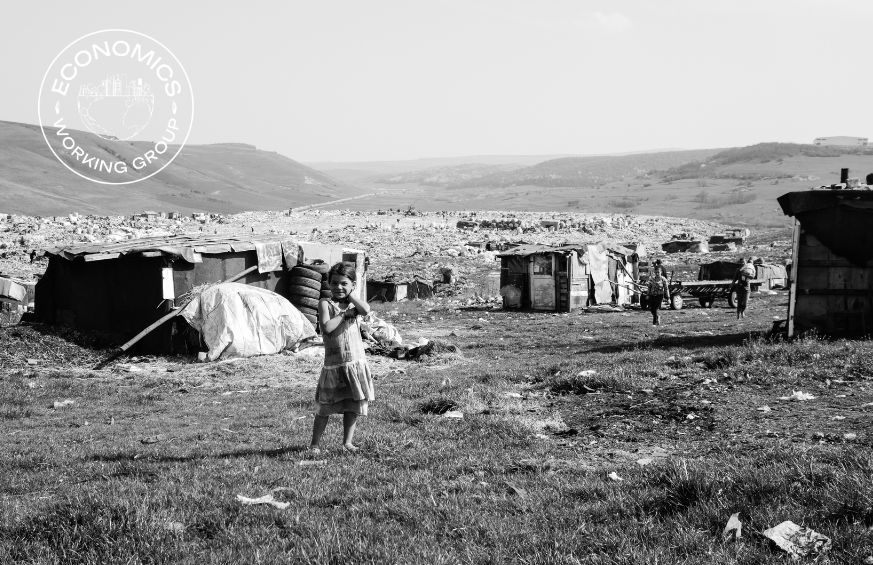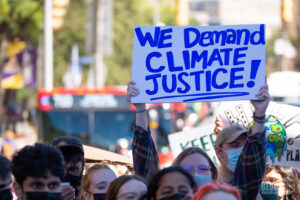COP28 in the United Arab Emirates closed a few days ago. A Loss & Damage Fund was finally set up. But no real progress was made on the most important topic: Who pays for the necessary transformations of our economic systems? What about the lifestyle of the superrich? As is so often the case, this COP was about procedural rules and far less about the necessary financial resources. The EU’s Green Deal is also under massive pressure in the EU due to the conservative shift to the right and the further rise of the radical right. However, we must also acknowledge that the Green Deal has never been enough. We need to move beyond it for practical and realistic reasons. The authors rightly focus on the colonial aspects of our European economic system and argue for climate justice as a counter-model. They conclude their text with demands from left-wing movements to politicians.
Roland Kulke, 20.12.2023
This article is part of transform!’s Economics Working Group Blog Series
As EU parliamentarians and civil servants race towards the last stretch of the current political mandate, the countdown to push through key legislation before next year’s elections begins in earnest. Progressive movements fear the undoing of hard-won advancements – it was only in July that a right-wing attempt to strike down the European Green Deal’s Nature Restoration Law was narrowly avoided. But the European Green Deal is far from saved. And nor is it enough or just.
While Europe burns and floods summer after summer, the European Green Deal (EGD) is revealed as both short-sighted, while also wilfully ignoring the historical causes of climate change: colonialism and capitalism.
It offers a future of electric cars, clean and renewable energy sources, and a green growth devoid of the ethical qualms of fossil fuels. But the European Commission’s policy package to tackle the climate crisis is fundamentally flawed, and its impact not confined to the borders of the EU – despite its name.
Renewable technology relies on over-extracting natural resources from the Global South at the expense of racialised, indigenous, and rural communities. Touting green tech and renewables as a panacea to our woes will not address the social inequalities amplified and accelerated by climate change.
With extraction at the core of the EU’s recent free trade agreements with the rest of the world – including the on-going negotiations to close the EU-Mercosur trade deal to the detriment of South American forests, farmland and local communities – it’s clear the EGD hinges on continued access to global south resources. It considers this access a “strategic security question”, revealing little to no consideration for the resource needs or rights of others. [1]
At best, with the Commission’s current strategy a green transition may eventually be achieved. But at such high human and environmental costs, the parallel goal of a just transition becomes impossible.
In truth, it is a continent-wide greenwashing of colonialism and paternalism made anew.
The rate of economic growth experienced by the Global North at the turn of the 20th century mirrors the speed and scope of the growth needed to achieve the EU Green Deal; violently unjust and certainly not sustainable.
Without addressing Europe’s colonial history, the climate crisis can never be solved.
The myth of ‘green growth’
Centuries of extraction and exploitation of both people and resources in the Global South have meant that those who suffered from the atrocities of European colonialism are also those paying the highest price of the climate crisis.
These inequalities are revealed in the EU’s quest to become the first climate-neutral continent. The green transition at the core of the European Green Deal is propped up by the continued extraction and exploitation of racialised people and resources in the Global South.
Minerals from cobalt mines in the Democratic Republic of Congo are the key to renewable technology but are mined primarily by child labour, with entire communities being forced to sacrifice their health, well-being, education, and future for cleaner, greener cars in the EU. The current civilian massacres in the DRC are a direct result of the scramble to secure access to Congolese cobalt. Forced evictions were led by multinational companies looking to expand their mining projects – by end of October, the IOM was reporting a record high of 6.9 million people displaced.
In Europe, Saami indigenous organisations in Sweden have mobilised in the face of threats to their indigenous lands, resources, and cultural traditions in the name of “green energy”. Europe’s extractivist policies will continue to ravage indigenous lands in Sweden and Finland, where the heart of the EU’s domestic supply of critical raw materials can be found.
Unfortunately, EU policy and European climate activism overlook the racial, social, and economic justice dimensions of the climate crisis and how it disproportionately impacts our communities.
“The EU must integrate anti-racist and decolonial goals into its quest for the natural resources necessary to the green transition, address racial justice as a climate justice issue, create space for civil society to contribute, and decouple from fossil fuel industry influence and funding, as the fossil fuel industry was the central driver of late European colonialism.”
Racially, socially, and economically marginalised groups and communities in Europe are also disproportionately impacted by the triple crisis of climate change, environmental racism, and insecurity.
In Cluj-Napoca, Romania, Roma residents who have been expelled for decades to dangerous and unhealthy landfills on the outskirts of the city have sued the authorities over these evictions. In Ireland, where Traveller communities are continuously denied reliable access to water, affordable heating and electricity, Traveller organisations have started to collaborate with climate and other anti-racism organisations to maximise their impact.
European-wide utility poverty has been growing since Covid-19, and worsening exponentially following the geopolitical impacts of the illegal Russian invasion of Ukraine. Currently, 1 in 4 households in the EU cannot afford to adequately light, heat, or cool their homes.
The short-lived relief of spring after a freezing winter with sky-high heating bills has been followed by yet another summer of record-breaking temperatures across the EU, putting millions of vulnerable people at risk.
There is no reason to think these cycles won’t continue year after year without urgent climate action. Meanwhile, environmental recovery activities and policies continue to plan for ‘future needs’ rather than the present dangers our communities are facing.
The progressive answer to climate change is climate justice
Climate justice is not a policy win or a luxury: it’s a necessity for racialised communities in Europe and those in the Global South. It cannot be brought about through incremental policy changes. Climate injustice is a current reality that has tangible impacts on the health, safety, and prosperity of our communities.
While the Intergovernmental Panel on Climate Change issues its final warnings, we know that marginalised communities have already been living on borrowed time.
If policymakers, lawmakers, and activists are serious about a truly fair and just transition, they need to shift the debate from climate change mitigation and adaptation towards climate justice, which acknowledges the complex web of oppression (and their historical roots) faced by racialised communities. This means moving away from quick fixes that uphold a fundamentally broken system, towards policies and laws that change the system itself.
With the threat of the far-right looming large over the upcoming EU elections, direct action by progressive EU Parliamentarians is more urgent than ever. We are once again at the mercy of an electoral cycle which favours the reactionist right and goads concessions from the European centre, especially with the rise of climate sceptic parties across the EU.
“Without addressing Europe’s colonial history,
there will be no solution to the climate crisis.”
Progressive and left parties need to approach the climate crisis and all potential solutions through an intersectional lens that acknowledges the disproportionate harm of climate injustice on our communities here in the EU and in the Global South.
Community-led responses – like the Climate Justice Alliance – with those most impacted at the forefront of policy, strategic litigation, and campaigns, are crucial to understanding the immediate nature of the climate crisis and executing decisive, impactful action.
EU climate policy must integrate an anti-racist perspective and approach, just as anti-racist work must include climate justice. This means integrating anti-racist and decolonial goals beyond EU equality strategies and into all policy, a political commitment to addressing racial justice as a climate justice issue, and creating space for international civil society voices to contribute to climate policy.
It must also completely decouple from fossil fuel industry influence and funding. Moving away from the fossil fuel industry, which was the central driver of late European colonialism, provides us with an immense opportunity to build a new system that is equitable for everyone.
Racialised communities have long been resisting the impacts of climate injustices and the encroachment of neocolonial, capitalist, and extractivist climate mitigation policies across Europe and the Global South.
A greening of capitalism doesn’t erase the need for resources, it just drives the need for different ones that will be equally exploitative.
It’s time for the EU to get behind us.
This article was written based on the issues raised during a joint panel on climate change and racial justice. It synthesises the views of the contributing panellists from the European Network Against Racism (ENAR), Equinox Initiative for Racial Justice, and Systemic Justice.
For more, please see:
About the authors:
Pia Eldergill is Climate Justice Organiser, Systemic Justice. Pia has a background in community and youth provision, working for a range of charities that deal with social protection, advocacy, education, and environment. She is also a climate justice activist and a member of the UK Youth Climate Coalition.
Stephanie Richani is Advocacy Lead at Equinox Initiative for Racial Justice. Stefi has a background in communications and EU policy, working on issues like law enforcement, migration, gender and climate. Equinox Initiative for Racial Justice is a people of colour-led organisation working to advance rights and justice for all people in Europe.
Image: Romani settlement, Cluj landfill, Pata Rât, Romania (2014) by Alessandro Galantucci (CC 2.0)
Footnotes
[1] “Access to resources is also a strategic security question for Europe’s ambition to deliver the Green Deal” – European Commission Communication on the European Green Deal



